 Another recent author I've been meaning to try for a while. Well, I've read a short story or two but this is the first novel. This, apparently, is an introduction to the world of Ian Cormac, a legendary ECS agent on the side of law enforcement. He's had his brain hooked up to the information grid ("gridlinked") for so long that he's losing his edge and now he's expected to carry out his next mission without it in an attempt to restore his humanity. But there is more to it than meets the eye and it's not helped that a bloodthirsty maniac is on his tail, hell bent on revenge.
Another recent author I've been meaning to try for a while. Well, I've read a short story or two but this is the first novel. This, apparently, is an introduction to the world of Ian Cormac, a legendary ECS agent on the side of law enforcement. He's had his brain hooked up to the information grid ("gridlinked") for so long that he's losing his edge and now he's expected to carry out his next mission without it in an attempt to restore his humanity. But there is more to it than meets the eye and it's not helped that a bloodthirsty maniac is on his tail, hell bent on revenge.All in all I didn't particularly engage with this novel, at least in part because I'm not overly fond of Space Opera. Another reason is that I didn't find the protagonist that interesting or engaging. The story was entertaining enough but it all got a bit mysterious and mystical at the end in a way that I found slightly dissatisfying. Not an unpleasant reading experience but I am left wondering whether I will ever seek out any more of his novels.
A Voyage to Arcturus
 This is going to be one of those books that is really hard to talk about. Not because I'm worried about giving away spoilers, but rather because I'm not sure how much I understand it.
This is going to be one of those books that is really hard to talk about. Not because I'm worried about giving away spoilers, but rather because I'm not sure how much I understand it.It starts well. A group with a common interest in witnessing the supernatural come together to observe a "summoning", that goes well until interrupted by a rude stranger. One of these observers (Maskull) is then invited by the stranger to visit Arcturus, a planet in a distant binary star system. Unbelieving at first, he is eventually convinced to see go along with him. The voyage begins from a remote observatory in Scotland and Muskall is put to sleep for the journey. He awakes on Arcturus abandoned by his companions and finds himself now in possession of an alien body with strange appendages and new sense organs.
Things then get stranger by the page as he Maskull journeys across this new planet, drawn northwards and encountering an array of alien beings who briefly accompany him on his travels. The importance of his physical journey gradually begins to dwindle in the wake of his spiritual, philosophical and moral journey.
Towards the end, the essential nature of existence is unveiled turning any preconceptions we might have had until that point on their head. That is, preconceptions I might have had had I not read the spoiler ridden introduction first.
All in all it was fairly hard work but should appeal to those that like reading a narrative that consists mainly of philosophical musings and descriptions of deeply imaginative environments.
Starship Troopers
 My reading this novel was long overdue and I looked forward to it eagerly, especially after seeing how much controversy it still generates today. Now that it comes to reviewing it, one thing I don't really have to worry about is spoilers. This isn't a conventionally plotted novel, more a reflection of the protagonist's (Rico) military career.
My reading this novel was long overdue and I looked forward to it eagerly, especially after seeing how much controversy it still generates today. Now that it comes to reviewing it, one thing I don't really have to worry about is spoilers. This isn't a conventionally plotted novel, more a reflection of the protagonist's (Rico) military career.What particularly makes this novel so controversial is that Heinlein is postulating, in his own inimical away, a utopian military led society. Furthermore, only those who have served at least a two year term in the military get to become full citizens (which includes getting the vote). Heinlein not only portrays his utopian vision, but forcefully makes the case for it through the polemics of several of the characters in the story.
There is, what might surprise some, a distinct lack of emphasis on action with most of the pages devoted to Rico learning his lessons both while in training and prior to that in school at the hands of his philosophy and history teacher. One thing that didn't sit too well with me was how the teaching of philosophy in this future had become so didactic and full of certitude. Every proposition could be proved or disproved with mathematical certainty.
I like SF when it explores different social ideas, even when I tend to disagree with them, but I tend to prefer an approach that isn't so intent on leading the reader to a particular conclusion. But that's not Heinlein's style. When he conceives of an idea, he gets behind it 100%, inevitably leaving the reader feeling preached at.
If anything, the ideas presented here are more out of phase with the current western cultural consensus than it was fifty years ago and I suppose this has lead many people to think Heinlein must have meant this as a satire. But I don't think that at all. Heinlein is attempting to answer questions and solve problems that we still haven't solved today. However wrong we might think he was, we have no right to glibly dismiss his answers. How do we ensure the power wielded by the electorate is matched by a sense of responsibility to society? How do we maintain an adequate defence against aggressors when strategically speaking attack is often the best form of defence? These are real quandaries for me and I don't know the answer.
In many ways, this is a very egalitarian novel and at times startlingly prescient. Men and women are fully equal in this society and race is irrelevant. His visions of gangs of feral children terrorising the streets towards the end of the 20th century won't seem so far fetched to many of you. The corruption of our politicians, riddled with self-interest described as the inevitable result of our universal suffrage can hardly be denied. What people have issue with though is Heinlein's radical solutions.
Inevitably a somewhat idealised vision of the military is required to make this all work. If a military run society sounds more like a dystopia to you, bear in mind that Heinlein envisages a most benign form of military leadership. There's no martial law and people are generally as free as they ever were. There's less crime and lower taxes. You might dismiss this all as idealistic nonsense but I can't help but admire, for all it's flaws, Heinlein's bold vision.
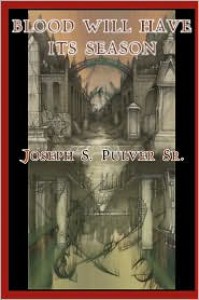 I had high hopes coming to this collection. Here is one of the exceptional prose writers that modern horror has to offer, so I was given to believe. Naturally I was very excited but that excitement began to slip away as, story after story, I began to realise this was very different from what I expected.
I had high hopes coming to this collection. Here is one of the exceptional prose writers that modern horror has to offer, so I was given to believe. Naturally I was very excited but that excitement began to slip away as, story after story, I began to realise this was very different from what I expected.Joseph Pulver approaches the page as an impressionist painter approaches the canvas, painting words onto the page in broad strokes with lyrical flashes of imagery, subverting the rules of grammar to maximise the effect. His prose style reminds me of Ray Bradbury when he waxed most lyrical, but far more concerned with themes of urban and moral decay. I was also put in mind of Ramsey Campbell in short story form but far less concerned with plot.
Pulver is obviously a widely read and big fan of the genre and one theme that recurs in many of the stories here is the "King in Yellow" (Robert W. Chambers). I was even inspired to pick up The King in Yellow and re-read a few of the stories to freshen my recollection of them so I might better appreciate what Pulver was trying to do with the theme. It reminded me how much I enjoyed those stories and didn't help at all in my appreciation of Pulver's work.
There are a large number of stories, poems and vignettes contained herein, all very short and stylistically varied. Some of them I did quite enjoy but then others, I simply had no idea what it was about from start to finish. Generally, I found it very hard to engage and not an enjoyable experience. I accept that this more a personal reaction and not necessary an indictment of the authors abilities in any object sense.
I've put the book down with a few stories still unread but I just can't face any more right now. I doubt I'll read anything more by the author unless I can be convinced that it is substantially different from what I've read here.
 It never really occurred to me that Daphne du Maurier would have written anything of particular interest to me but then I heard about this collection of "chilling" stories, I thought I should give it a go. And I'm very glad I did.
It never really occurred to me that Daphne du Maurier would have written anything of particular interest to me but then I heard about this collection of "chilling" stories, I thought I should give it a go. And I'm very glad I did.It is a long time since I saw Hitchcock's "The Birds" but, judging by the introduction, that's probably just as well. Anyhow, I really enjoyed this story, it had a great apocalyptic feel to it and a sense of hopelessness and despair for humanity, despite the father's desperate efforts to save his family.
Only three of the six stories here had anything supernatural about them (and I'm including "The Birds" in those three). Of the remaining three, two were romances that had a dark twist at the end and the last story "The Old Man" had a great twist turning the reader's perspective on it's head at the end.
My favourite of the collection though is "The Apple Tree". A story of an old man who initially feels liberated from his tiresome wife when she dies, then gradually becomes obsessed by an apple tree in his garden that somehow reminds him of everything he didn't like about his late wife. Daphne handled this one masterfully, leading the reader to sympathise more with the Husband at first but gradually shifting this in his wife's favour as the story progresses.
A great introduction to her work and definitely leaves me wanting to read more.
Mrs. Midnight: And Other Stories
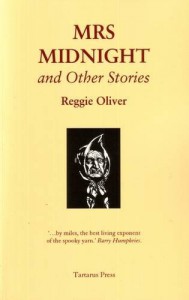 I've been hearing good things about Reggie Oliver for a while. He's apparently quite a productive writer with numerous collections to his name. A modern writer of strange and spooky stories but in the classic vein which sounds very much like my cup of tea.
I've been hearing good things about Reggie Oliver for a while. He's apparently quite a productive writer with numerous collections to his name. A modern writer of strange and spooky stories but in the classic vein which sounds very much like my cup of tea.Thematically, most of the stories here revolve around the activities of thespians and antiquarians as they encounter strange goings in their day to day lives. The plots were varied enough not to feel samey but similar enough to give the collection cohesion.
His prose style is clear and pleasing enough to read and the stories are carefully constructed although the endings often felt a little flat to me. I usually enjoyed the overall story execution more than the resolutions that sometimes felt like the punchline of a bad joke or just generally underwhelming.
There were no really bad stories here but neither did I feel that there were any outstanding. Generally all of a good but not great standard. I also enjoyed the spooky illustrations before each story. All in all, good enough to make me want to pick up something else of his one day.
 Surely, in coming to this volume, you will have already read the first and your fascination with Jorg's character has overcome your distaste. Weeded out already are those who were not prepared to read about a protagonist they wouldn't want to be best buddies with and the generally squeamish. Those who read this volume should already know what they are letting themselves in for. If you couldn't abide the first book, you wont want to read this.
Surely, in coming to this volume, you will have already read the first and your fascination with Jorg's character has overcome your distaste. Weeded out already are those who were not prepared to read about a protagonist they wouldn't want to be best buddies with and the generally squeamish. Those who read this volume should already know what they are letting themselves in for. If you couldn't abide the first book, you wont want to read this.In this volume, the character of Jorg continues to ripen, to blossom into the thistle that he is. We continue to see him triumph against all odds, carry himself through almost by sheer determination and force of will, a willingness to do whatever needs to be done, make any sacrifice asked of him. But perhaps we're also starting to see a maturation as he finds himself with regrets and starting to care about the poor and defenceless.
This is a more complex novel than it's predecessor, again with a split narrative structure between the past and present, but further complicated by mysterious gaps in his recollections as hard and dangerous memories are locked away only to resurface later. We also find out a little more about the world and its past, and how it came to be. But what one most wants to know is what lies ahead in its future and for that we will have to wait for the final part of the trilogy.
 When I started reading this, I wondered is it really a "Young Adult" novel? Or do people simply call it that because the protagonist is a teenager? But as the story unfolded, it became clear to me that it was truly aimed at young adults because the protagonist was repeatedly spared the necessity of making the really tough decisions and sacrifices that one might have in her situation. Events and circumstances always unfolded in such a way that she never had to kill any of the "nice" kids, only the nasty "career tributes", and never in cold blood, only in a desperate act of self defence (or defence of someone she cared about).
When I started reading this, I wondered is it really a "Young Adult" novel? Or do people simply call it that because the protagonist is a teenager? But as the story unfolded, it became clear to me that it was truly aimed at young adults because the protagonist was repeatedly spared the necessity of making the really tough decisions and sacrifices that one might have in her situation. Events and circumstances always unfolded in such a way that she never had to kill any of the "nice" kids, only the nasty "career tributes", and never in cold blood, only in a desperate act of self defence (or defence of someone she cared about). Still, it was a page turner and breezy read, with every chapter ending on a cliff hanger, it was hard to put down. An interesting dystopian setting although not a particularly original premise. The ending was decisive in some ways but left a large number of loose ends. Most importantly one is left wondering if anything will ever be done to loosen the grip of the oppressive regime that so ruthlessly holds down the districts in virtual slavery in order to maintain high living standards at the capitol, not to mention forces some of their children each year to fight to the death for their amusement.
I don't think I'll read any more books in the trilogy, and just leave it there. An enjoyable although somewhat shallow experience.
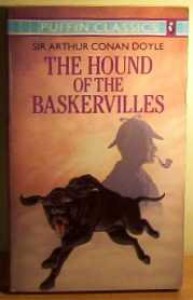 I wasn't expecting to read any more Sherlock Holmes stories so soon after finishing The Adventures and Memoirs of Sherlock Holmes but I stumbled upon this, second hand, on a charity book stall. I'm glad I did though because it was very good.
I wasn't expecting to read any more Sherlock Holmes stories so soon after finishing The Adventures and Memoirs of Sherlock Holmes but I stumbled upon this, second hand, on a charity book stall. I'm glad I did though because it was very good.As well as this being one of his more well known stories, I had a particular interest living so near to north Dartmoor where most of the events in this novel take place. Although I suppose it was necessary to the story to emphasise the bleak and brooding nature of the moor, it was somewhat at odds with my feelings about it when I am abroad on it's rugged slopes. And I suppose it reflects the age in which it was written, in which the wilderness was still seen as something to be conquered and tamed by man, not a delicate and endangered thing of beauty as we see it now.
The story itself definitely stood out as one of the better Sherlock Holmes mysteries I have read. I tend to prefer it when he's up against more worthy adversaries and the supernatural aspect also appealed to me strongly. I'm not sure if I'll read any more of these stories but, if not, it is good to end on a high.
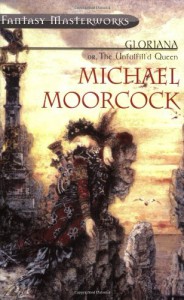 Michael Moorcock is well known for having strong views on what type of fantasy he likes and what he doesn't. For instance, he doesn't like Tolkien but does like Peake, to whose memory he dedicated this book. It's a long time since I read the Gormenghast trilogy but there are some obvious parallels although I didn't dwell on these; I wanted it to stand up as a story in it's own right. And it certainly did.
Michael Moorcock is well known for having strong views on what type of fantasy he likes and what he doesn't. For instance, he doesn't like Tolkien but does like Peake, to whose memory he dedicated this book. It's a long time since I read the Gormenghast trilogy but there are some obvious parallels although I didn't dwell on these; I wanted it to stand up as a story in it's own right. And it certainly did.The events of this story take place in some kind of alternative version of our history at which the British empire (referred to here as "Albion") is at it's hight and in the midst of an apparent golden age of glory and peace. The focus is on the fictional queen "Gloriana" (who seemed to me some kind of cross between Elizabeth the 1st and Victoria) and the rather large cast of characters who spend much of their time in and around the labyrinthine palace, from the lordly to the lowly, the lords, ladies, ambassadors, spies, soldiers, poets, rogues and the mysterious characters who roam the lost corridors and rooms in the forgotten depths of the palace.
Although the author can't help but weave into the story mention of the multi-verse and hints of characters that one might have read else where from his extensive canon, once the new facts of the situation are accepted, little suspension of disbelief is required. The story is concerned with the intricacies and intrigues of court and political life. Gradually the facade crumbles and the perfect vision of Albion and the Queen are revealed for the myth that they are.
Stylistically, this is quite different from anything else I've read by Moorcock and it proves his versitility as a writer. An engaging storyline and intriguing characters made this a very enjoyable read. Not for younger readers as it contains some very adult themes but I can see why it is regarded by some as a masterwork of fantasy.
The Adventures and Memoirs of Sherlock Holmes
 Finally, I got around to reading some stories about the famous Sherlock Holmes. This book combines the first two collections of short stories the author wrote about the wily detective.
Finally, I got around to reading some stories about the famous Sherlock Holmes. This book combines the first two collections of short stories the author wrote about the wily detective.His amazing powers of observation and reasoning mean that little gets past Sherlock once he turns his attention to it. He constantly assimilates facts and particulars so that he might be able to make use of them at a later date. A knowledgeable amature chemist, no mean boxer and sublime violinist; he is a man of many talents. A fascinating character, it is probably more interesting observing him at work than it is becoming acquainted with the details of the cases he investigates.
I enjoyed reading most of these stories but I had to break them up so it took several months to complete this not insubstantial collection. A few really stand out, like "The Naval Treaty", "The Scandal in Bohemia" and "The Final Problem" but many others blur together in the memory due perhaps to their sameness. I get to the end feeling that I don't need to read any more of the short stories although I think I'd like to try a novel, probably The Hound of the Baskervilles.
Rediscovery of Man (Sf Masterworks 10)
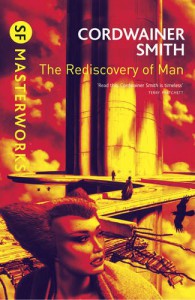 Cordwainer Smith is a most unusual story writer whose execution and creativity in ideas usually outshone the way they were ended. One usually expects a good, decisive ending to a SF short story but such was the sheer strangeness of his ideas, his poetical prose style and varied range of narrative techniques that I didn't mind too much.
Cordwainer Smith is a most unusual story writer whose execution and creativity in ideas usually outshone the way they were ended. One usually expects a good, decisive ending to a SF short story but such was the sheer strangeness of his ideas, his poetical prose style and varied range of narrative techniques that I didn't mind too much.This collection contains about half the stories the author published pertaining to his vision of a future history of mankind. They are arranged in chronological order within this story arc with often thousands of years in between stories. In Smith's vision of our future, our civilization eventually collapses but from the ashes a new civilization emerges guided by the benign Instrumentality that strives to protect and nurture mankind towards it's ultimate state of being.
There are many thematic threads running through this collection. We see mankind's relationship with animals evolve as we see the "pinlighters" working with cats telepathically to protect interstellar ships from the ravages of all consuming menace that thrives in the darkness between stars. Later animals are moulded into human form are are used as slaves and their striving and gradual struggle for equality and freedom.
We also see perhaps Smith's own evolution of ideas about how you can maximise human happiness. Can it be by protecting people from uncertainty, pain, strife and suffering? Or does mankind only truly thrive in adversity?
This is not for those who want everything explained and rationalised. Much is left to the reader to speculate upon. But I was constantly surprised by the elegance and rhythm of the prose that, again, is not something one often expects with SF. In a way, this is more a fantastic retelling of myths and legends told in a far distant future.
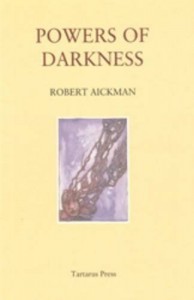 This collection contained two stories I have read before, only one of which I re-read on this occasion, and four others that were new to me.
This collection contained two stories I have read before, only one of which I re-read on this occasion, and four others that were new to me.In "Your Tiny Hand is Frozen" Aickman reveals his distaste for telephones and the social sickness they can lead to as people become addicted to their use and the rest of their life suffers. Perhaps the telephone network is nothing but a metaphorical sea of detached, disembodied and lonely people trying to make contact with others. The author follows this chain of thought to it's terrifying extreme.
In "My Poor Friend" we get a story that possibly parallels Aickman's own experiences in lobbying government on behalf of the Inland Waterways Association. The endless committees, discussions and procrastinating is palpably felt.
"Larger than Oneself" is about a successful businessman who, in the interests of finding a common ground between the many different religions, invites a selection of important theological thinkers and religious leaders to his house for a gathering. While he hopes to unify their sense of purpose he begins to despair, ironically missing the event in which the rest get unified in a new and terrifying way.
"The Wine-Dark Sea" is one of Aickman's less esoteric stories, perhaps making a good entry point for those new to the author's work although it appears at the end of this collection.
All of the stories were suitably strange, with layers of meaning buried beneath the surface and delivered in Aickman's usual quality prose style. But I'm going to be hard line and mark this collection down a star simply to indicate that I didn't think this collection was quite as strong overall as the others I have read. Still very good though.
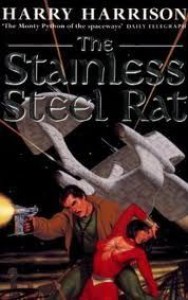 I don't know why but I was expecting something more like vintage space opera from the 30's and was surprised to find this was actually written in the mid '60s and still feels fresh.
I don't know why but I was expecting something more like vintage space opera from the 30's and was surprised to find this was actually written in the mid '60s and still feels fresh.This is light, fast-moving, edge of your seat stuff that you will whip through in no time. A charming, loveable rogue protagonist is nearly impossible not to engage with. While he think's he's clever, he still gets outsmarted on quite a regular basis, his fallibility only making him more likable. There is very little world building and scene setting either to drag down on the pace of the story allowing the reader to focus on the characters and the fast-moving story.
I'm not sure how much of this long series I'm going to read but I wouldn't be surprised if I end up reading quite a few of them. Perfect for when you just want something light and fun but not lacking a certain wit.
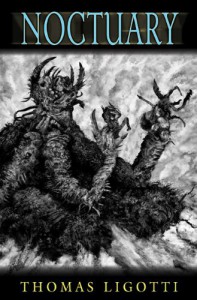 I've been looking forward to reading something again by Ligotti for quite a while now. Having ploughed through (and thoroughly enjoyed) Teatro Grottesco and My Work Is Not Yet Done, the two most readily available collections of his fiction available. So I took advantage of one of his older collections briefly flashing in and out of print with Subterranean Press's run of limited edition hardbacks.
I've been looking forward to reading something again by Ligotti for quite a while now. Having ploughed through (and thoroughly enjoyed) Teatro Grottesco and My Work Is Not Yet Done, the two most readily available collections of his fiction available. So I took advantage of one of his older collections briefly flashing in and out of print with Subterranean Press's run of limited edition hardbacks.It features an introduction by the author himself as he ruminates on the essential essence of the weird story. Then the stories themselves are divided into three sections, the first two concerned with a particular theme, the last section being a thematically unconnected array of short vignettes.
As I have come to expect with Ligotti, there were some great stories here with his usual eloquent prose style but somehow the collection didn't quite resonate with me as strongly as his other work has done. Especially the last section where the especially short format didn't really work for me (for the most part). It seems that such an assessment brings me in line with many other reviewers of this book.
 Not since I read the great epic The Broken Sword have I read any of this author's fantasy and I was hoping to be wowed a lot more than I was.
Not since I read the great epic The Broken Sword have I read any of this author's fantasy and I was hoping to be wowed a lot more than I was.The story was okay but had a few little quirks that detracted from my enjoyment such as the pointless Scottish accents of the protagonists two travelling companions and the boundless chauvinism that made me wince when I thought what I female reader might think reading this.
It was interesting to see how this had such a strong influence on Michael Moorcock though. Here we see the perpetual struggle between law and chaos, a concept of the multiverse and a hero being drawn across time and space at times of crisis, reminiscent of John Daker and the Eternal Champion. Moorcock was even quoted on the back cover singing the praises of this book so it is clear that the link wasn't incidental.
But for me, this just isn't as timeless as "The Broken Sword". I can imagine it felt a lot more original and fresh when it first appeared but now it feels very safe, full of well-worn fantasy tropes and clichés. Not a bad book but of little interest, other than to those studying the history of modern fantasy.



